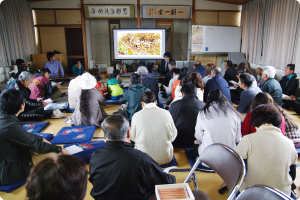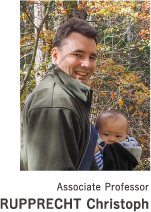Environmental Design
Practical Study of Comprehensive Design for the Natural and Social Environments
An educational framework integrative of the humanities and sciences, incorporating both natural and social science, provides students with foundations of practical knowledge and skills relevant to comprehensive design for the natural and social environments. This curriculum serves to cultivate human resources equipped to grasp the crises facing regional communities and cooperatively engage in the building of sustainable regional communities where people and nature coexist in harmony.
Major Research Themes
- Intra-regional cooperation aimed at establishing wintering grounds for cranes
- Research on resource management in deserted villages
- Research on the potential of using “nature contact surveys” in nature restoration projects
- Analysis of public citizens’ preferences regarding approaches to maintaining and utilizing abandoned farmland
- Research on the practical implementation and evaluation of community building for post-disaster reconstruction
- Disaster resilience research with a focus on regionality
- Considering sustainable frameworks for clothes recycling
- Research on regional disaster preparedness using disaster simulation
- Sustainable business strategies for agricultural, mountain, and fishing villages
- Research on sustainable regional innovation aimed at solving environmental problems
- Research on communication-focused public governance
|

|
Considering Optimal Relationships Between People and Nature

Human happiness depends wholly on the environment and on other living things. As such, environmental design takes on the vital role of making reconsiderations of relationships between people and nature while facing the challenges of natural disasters and of man-made disasters such as climate change. The period from now through 2030 holds the key to the realization of a sustainable society in the days ahead.
In the Department of Environmental Design, diverse faculty members engage in research from the global scale down to regional communities, applying concepts, wisdom, and technologies from widely varied fields of specialization, including disaster prevention, community development, environmental policy, Global Environmental Studies, landscape design, art and games, geography, and geographic information systems (GIS). Students will undoubtedly find an optimal fit with their interests here, from intriguing conundrums to issues they can contribute to themselves in concrete ways.
Please come join forces with us at the Department of Environmental Design. Let’s work together to imagine and realize design for a fun future in which people and nature coexist and mutually flourish!


